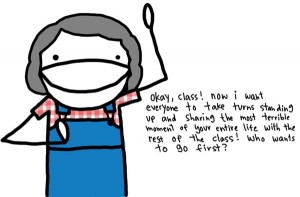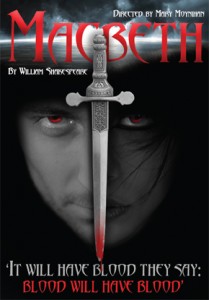PLOT
Phase 2 = Murder of Duncan → Crowned King
Macbeth kills Duncan (Act 2, scene 1 soliloquy – “Is this a dagger which I see before me?”) with his wife’s help, but he is plagued with guilt for the crime. When Duncan’s murdered body is discovered, Macbeth immediately kills the accused guards so that he can cover his tracks. Lady Macbeth also faints to distract attention from her husband. Duncan’s sons, Malcolm and Donalbain, flee Macbeth’s castle in fear for their lives. They are suspected of bribing the guards to kill their father. Macbeth assumes the Scottish throne.
PHASE 2 – Crime & Concealment
The Witches
They play no part in this section of the play.
Lady Macbeth
Lady Macbeth is a good actress – she welcomes Duncan managing to “look like the innocent flower but be the serpent under it” and she gets the chamberlains drunk as planned but she needs some Dutch courage herself (“that which hath made them drunk hath made me bold”). Even then she hesitates to be the one who actually carries out the crime (“had he not resembled my father as he slept, I had done’t”). Once the deed is done she regains her steely determination, dismissing his husband’s misgivings as foolish (“A little water clears us of this deed”) and returning to the scene to plant the daggers on the chamberlains and smear blood on their faces, thus framing them for the crime. She even faints to draw attention away from her husband after he reveals that he has killed the grooms (the only ‘witnesses’ to the crime).
Circumstances
Malcolm and Donalbain know that the chamberlains had no reason to kill their father. So the chamberlains either did it but were hired assassins or they didn’t do it, in which case someone else is guilty. As next of kin Malcolm and Donalbain know that suspicion will fall on them but they don’t feel safe staying in Scotland – whoever killed their father might come after them. Once they flee however, it is easy to lay the blame at their feet!
Macbeth
Macbeth knows he’ll need powerful allies once he’s in power so before he kills Duncan he tries to get Banquo on side (“if you shall cleave to my consent when tis it shall make honour for you”). However Banquo vows to keep his “allegiance clear”. Immediately before the murder Macbeth hallucinates a dagger but admits that it simply leads him the way he was going anyway! Immediately after the crime Macbeth is almost paralysed with grief and remorse and becomes convinced that “Macbeth shall sleep no more” – his guilty conscience will transform him into an insomniac.
“Will all great Neptune’s ocean wash this blood
Clean from my hand? No, this my hand will rather
The multitudinous seas incarnadine”
However, once the house awakens and the possibility of being caught becomes a real and present danger, Macbeth manages to pull himself together, ironically commenting after returning from ‘discovering’ Duncan’s dead body “Had I but died an hour before this chance, I had lived a blessed time” – he may actually mean this. There’s no doubt that he wishes the events of the past hour had never happened but it’s too late for regrets now if he wants to protect himself and his wife. He even impulsively murders the grooms and then fakes remorse “yet I do repent me of my fury that I did kill them” making him in some ways almost as good as actor as his wife. What he says must seem suspicious however because this is the point at which his wife faints to draw attention away from him.







